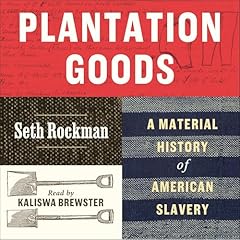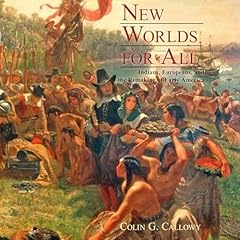
The Scratch of a Pen
1763 and the Transformation of North America
No se pudo agregar al carrito
Add to Cart failed.
Error al Agregar a Lista de Deseos.
Error al eliminar de la lista de deseos.
Error al añadir a tu biblioteca
Error al seguir el podcast
Error al dejar de seguir el podcast
 Exclusivo para miembros Prime: ¿Nuevo en Audible? Obtén 2 audiolibros gratis con tu prueba.
Exclusivo para miembros Prime: ¿Nuevo en Audible? Obtén 2 audiolibros gratis con tu prueba.Compra ahora por $17.33
-
Narrado por:
-
Simon Vance
In February, 1763, Britain, Spain, and France signed the Treaty of Paris, ending the French and Indian War. In this one document, more American territory changed hands than in any treaty before or since. As the great historian Francis Parkman wrote, "half a continent...changed hands at the scratch of a pen."
As Colin Calloway reveals in this superb history, the Treaty set in motion a cascade of unexpected consequences. Indians and Europeans, settlers and frontiersmen, all struggled to adapt to new boundaries, new alignments, and new relationships. Britain now possessed a vast American empire stretching from Canada to the Florida Keys, yet the crushing costs of maintaining it would push its colonies toward rebellion. White settlers, free to pour into the West, clashed as never before with Indian tribes struggling to defend their way of life. In the Northwest, Pontiac's War brought racial conflict to its bitterest level so far. Whole ethnic groups migrated, sometimes across the continent: it was 1763 that saw many exiled settlers from Acadia in French Canada move again to Louisiana, where they would become Cajuns. Calloway unfurls this panoramic canvas with vibrant narrative skill, peopling his tale with memorable characters such as William Johnson, the Irish baronet who moved between Indian campfires and British barracks; Pontiac, the charismatic Ottawa chieftain whose warriors, for a time, chased the Europeans from Indian country; and James Murray, Britain's first governor in Quebec, who fought to protect the religious rights of his French Catholic subjects.Most Americans know the significance of the Declaration of Independence or the Emancipation Proclamation, but not the Treaty of Paris. Yet 1763 was a year that shaped our history just as decisively as 1776 or 1862. This captivating book shows why.
The “Pivotal Moments in American History” series seeks to unite the old and the new history, combining the insights and techniques of recent historiography with the power of traditional narrative. Each title has a strong narrative arc with drama, irony, suspense, and – most importantly – great characters who embody the human dimension of historical events. The general editors of “Pivotal Moments” are not just historians; they are popular writers themselves, and, in two cases, Pulitzer Prize winners: David Hackett Fischer, James M. McPherson, and David Greenberg. We hope you like your American History served up with verve, wit, and an eye for the telling detail!
©2006 Colin G. Calloway (P)2006 Tantor Media, Inc.Los oyentes también disfrutaron:




















Reseñas de la Crítica
"Spellbinding....First-rate cultural history." (Publishers Weekly)
"Imbued with cultural erudition and diplomatic insight." (Booklist)
Las personas que vieron esto también vieron:


















But Calloway does go into into the politically correct game of blame. As in his book on Washington and his relations with Indians, Calloway points out the circumstances and lets the readers reach their own conclusions. Alas, almost all the political leaders are following their own agendas, and those are partially determined by the values, or some might sat lack of values, of the time.This reader can't help noticing, once again that the 'free space' in the English colonies created a land hunger in most individuals that is not seen in New France nor New Spain. The peace treaty of 1763 changed the lives of those on the American continent as much as the War had. Calloway keeps giving examples of how the peace changed the relations between people(s) once the French threat was gone.
Once again I am amzed at how good a narrator Simon Vance is. I can't imagine a better, more satisfying reading of this book.
excellent snapshot of 1763
Se ha producido un error. Vuelve a intentarlo dentro de unos minutos.
Wish it was longer.
Se ha producido un error. Vuelve a intentarlo dentro de unos minutos.
Spectacular Look into 1763
Se ha producido un error. Vuelve a intentarlo dentro de unos minutos.
short and to the point
Se ha producido un error. Vuelve a intentarlo dentro de unos minutos.
Any additional comments?
An excellent scholarly treatment of the multifarious outfalls of the Treaty of Paris of 1763, with particular reference to the influence of the cession to Britain of French-claimed lands between the Appalachians and the Great Lakes and Mississippi. All players are comprehensively discussed: the French colonists more or less abandoned by their home country; the American colonists hungry for western land and the benefits of Indian trade; policy-makers in London and Paris, and their militaries in interior North America; the Spanish, despoiled of Florida, and almost embarrassed by acquiring trans-Mississippi Louisiana; and above all the Indians beset by pressures on every side and no longer able to play British, French, and Spaniards against one another to try to maintain their independence of action, to secure their lands, and to maintain the trade essential to their survival.Many readers will be familiar with the general outline of this account, and with many of the names and places referenced, but few, probably, will have ever read a comprehensive treatment of all the moving parts in this story so pregnant for the immediate future of eastern North America in 1763. Note: this is decidedly not a history of the French and Indian war, which is dispatched in a matter of a few paragraphs preliminary to the main subject of the book.It is regrettable and remarkable that neither the director nor narrator knows how to pronounce "hegemony."A truly excellent scholarly account.
Se ha producido un error. Vuelve a intentarlo dentro de unos minutos.


